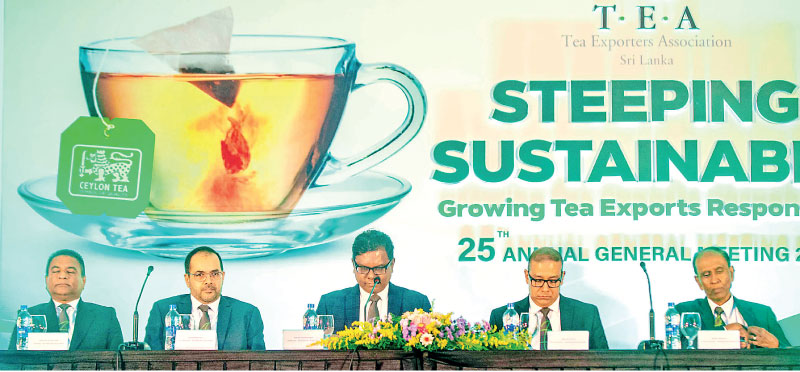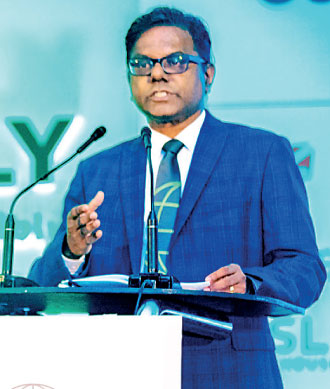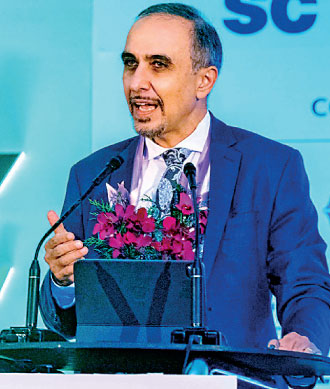Saturday Feb 21, 2026
Saturday Feb 21, 2026
Thursday, 12 September 2024 03:47 - - {{hitsCtrl.values.hits}}

 |
| TEA outgoing Chairman Ganesh Deivanayagam |
 |
| World Bank Country Manager – Sri Lanka and Maldives Gevorg Sargsyan
|
The Tea Exporters Association (TEA) held its 25th Annual General Meeting (AGM) on 6 September at the Grand Marquee, Taj Samudra, Colombo.
The event, a calendar highlight for the tea industry, hosted a distinguished gathering of over 500 key industry stakeholders and esteemed guests. Alongside celebrating TEA’s 25th anniversary, the AGM took the opportunity to highlight the Association’s enduring commitment to Sri Lanka’s tea industry, and its continued resilience amidst evolving global challenges.
The AGM was graced by the presence of World Bank Country Manager – Sri Lanka and Maldives Gevorg Sargsyan as the Chief Guest. This year’s theme, “Steeping Sustainably – Growing Tea Exports Responsibly,” resonated with the Association’s ongoing efforts to promote sustainable practices within the industry.
Founded in 1999, the TEA has established itself as the leading voice for Sri Lanka’s tea exporters, representing approximately 80% of the country’s annual tea export volume and value. The Association has played a pivotal role in shaping industry policy over the years, and has been at the forefront of various industry initiatives, continuously working to enhance the global standing of Sri Lankan (Ceylon) tea.
At the AGM, the Association paid tribute to its past leaders by presenting plaques of appreciation to former Chairmen, recognising their invaluable contributions to the industry. Meanwhile, Huzefa Akbarally was elected as the new Chairman of the TEA.
Addressing the gathering, outgoing Chairman Ganesh Deivanayagam said: “As I step down, I am proud of what we have achieved as an industry and an organisation. But there are still challenges ahead. 25 years ago, Sri Lanka exported 263 million kilos of tea, earning $ 598 million. Despite exporting 20 million kilos less, we’ve doubled our revenue to $ 1.3 billion. This speaks for the global value and demand for Ceylon Tea, but highlights the untapped potential we still have. If we could maintain our volumes, this would be a $ 3 billion industry. Yet, as exporters, we face significant hurdles, from taxation that burdens our cash flow to an outdated perception of our sector. However, the numbers don’t lie – we’ve done an extraordinary job, and I believe, with the right support, our resilience will see us through.”
The AGM also served as a platform to discuss the current state of the tea industry, focusing on the challenges that have impacted production and exports in recent years. Sri Lanka’s tea production, which reached a total of 256,039 metric tonnes in 2023, has faced a downward trend since 2019 due to various factors, including the impact of climate change, a ban on chemical fertiliser, and insufficient re-planting. Naturally, this has negatively impacted exports too, with total exports amounting to 241,912 metric tonnes in 2023, down from a high of 292,000 metric tonnes in 2019, highlighting the pressing need for strategic interventions to sustain the industry.
However, the country’s tea exports have continued to consistently generate around $ 1.3 billion in revenue annually despite easing export volumes, remaining a vital contributor to the national economy and demonstrating the unmatched quality and popularity of Ceylon Tea in the global market.
Noting these challenges and emerging opportunities, Chief Guest Sargsyan added: “As someone who grew up drinking Ceylon Tea, I have always felt a deep connection to this industry. The Sri Lankan tea industry has emerged to be both an important economic pillar and a source of national pride and icon – but has faced considerable challenges over the recent past. From climate change to policy inconsistencies and global market competition, the industry has been increasingly under pressure. Recent research indicates that by 2070, Sri Lanka’s optimal tea-growing regions could shrink by 30%. The sustainability of Sri Lanka’s tea industry is a multifaceted challenge, but one that we are well-equipped to address. As Sri Lanka moves towards a resilient recovery of the economy, revitalising the tea industry is a crucial step for economic growth. To ensure the continued success and sustainability of this unique brand, it is essential for all stakeholders – public and private sector – to unite in their efforts in enhancing growth across the entire ecosystem so it can meaningfully contribute towards a sustainable and prosperous future for the entire country.”
Another issue highlighted at the AGM was the Government’s decision to abolish the SVAT scheme from April 2025. The paperless SVAT system provides exporters with a significant level of relief towards the constraints on their cash flow requirements. The SVAT was introduced in April 2011 to help the export trade as there was a long delay in settling VAT refunds by the Inland Revenue Department under the previous system.
Tea exporters’ concerns on the termination of the SVAT facility are due to a number of factors. Of particular concern is that the termination of SVAT would cause liquidity problems for tea exporters who are already facing many challenges locally and abroad, as their funds would be blocked for a considerable period of time.
Accordingly, discussions at the AGM underscored the importance of addressing these issues, including the financial sanctions imposed by the US and EU on Iranian and Russian banks which have complicated payment processes for Sri Lankan exporters.
The critical need to adapt to changing market dynamics, such as a growing preference amongst the younger generation for herbal and fruit infusions over traditional tea blends, and capture emerging opportunities was also highlighted.